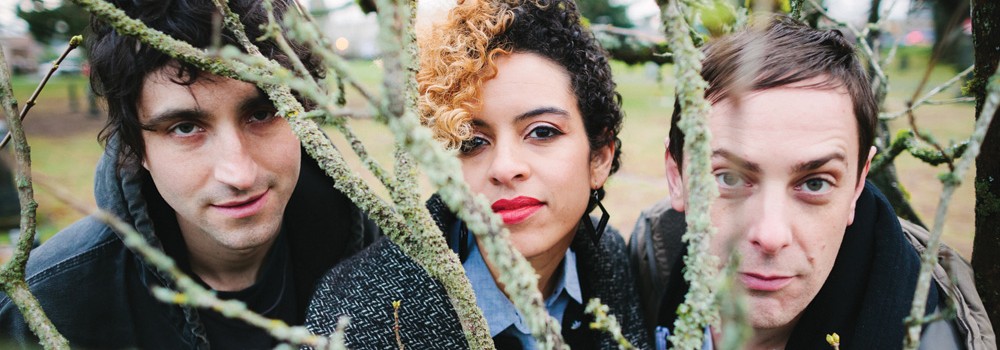The Thermals are ageless.
 Although 2016 marks some 20 years since Hutch Harris and Kathy Foster started making music together, it seems that ever since they plopped down in Portland in the spring of ’98 the two have been bathing in the rejuvenating rains and soggy sunbeams that flow freely from our nebulous skies. Along the way, the pair—Harris as principal songwriter, vocalist and guitar player and Foster with her thrumming, left-handed bass lines—picked up another vampiric young’un to hold down the rhythm section with Foster. Westin Glass has now been hitting the skins for half the band’s lifespan and been featured on just about half of their recordings.
Although 2016 marks some 20 years since Hutch Harris and Kathy Foster started making music together, it seems that ever since they plopped down in Portland in the spring of ’98 the two have been bathing in the rejuvenating rains and soggy sunbeams that flow freely from our nebulous skies. Along the way, the pair—Harris as principal songwriter, vocalist and guitar player and Foster with her thrumming, left-handed bass lines—picked up another vampiric young’un to hold down the rhythm section with Foster. Westin Glass has now been hitting the skins for half the band’s lifespan and been featured on just about half of their recordings.
Physically, they look just as youthful as ever; sonically, they’ve definitely grown up, yet still retain all of the vigor and audacity of their younger, punky, DIY years.
Time may smooth the stone—and the band has honed their songwriting craft, instrumental prowess and group chemistry over the years. But time will never wear it away—access to professional studios, gear and producers has only served to solidify The Thermals’ sound, not soften it. If things become smoother over time, each time the group enters the studio or takes the stage, all those smooth pebbles are vigorously shaken and ground into crunchy, jagged, punk rock gravel.
With the appearance of youth comes the perception that things just come easy to The Thermals. Their albums and live shows are blazing bursts of energy—fast, simple, straightforward, fun. It all feels so effortless.
“Nothing ever just happens,” Harris says. But with the records and live performances, “You’re trying to make it seem like it’s just happening. You don’t want it to sound like work—you want it to sound like some magic just happened. When really, it definitely is hard work.”
Yet, The Thermals are able to exude nonchalance, and their seventh record—We Disappear, due out March 25 via Saddle Creek—is no different. But this apparent ease comes from a place of honest excitement.
“Sometimes I didn’t even know if we would make another record,” Harris reveals. “We weren’t gonna make a record just to do it. When you’re younger, you think time is running, but as you get older, you’re like: Fuck it, who cares? Time is running out, so let it run out,” he laughs.
Sans external pressures, with no one rushing them, the band came back to the table naturally—after indulging in some extracurricular creative activities during their downtime. Glass and Foster formed a trio with Maggie Vail and released a noisy lo-fi record under the moniker Hurry Up; Foster, Vail and Jen Olesen started DJing around town and on XRAY.fm as Strange Babes; and Harris dove into stand-up comedy as well as writing original music for a couple of kids’ TV show pilots. Plus, the 2002, home-recorded, pre-Thermals, folk pop record Hutch and Kathy was released on vinyl via Jealous Butcher Records and the pair toured behind it, offering “a greatest hits of Kathy and my career,” Harris says.
 Comfortable and ready to lay down some music they were all thrilled about, the band split time between Portland’s Kung Fu Bakery and Seattle’s Hall of Justice, the home studio of ex-Death Cab For Cutie guitarist Chris Walla. We Disappear marks the third time Walla has produced a Thermals’ record, previously shepherding 2004’s Fuckin A and 2010’s Personal Life. “With Chris, we feel like he’s the fourth member of the band,” Harris says. Bringing a palpable energy to the studio, “He thinks about it the same as us. You can tell that he wants it to be as good as we want it to be.”
Comfortable and ready to lay down some music they were all thrilled about, the band split time between Portland’s Kung Fu Bakery and Seattle’s Hall of Justice, the home studio of ex-Death Cab For Cutie guitarist Chris Walla. We Disappear marks the third time Walla has produced a Thermals’ record, previously shepherding 2004’s Fuckin A and 2010’s Personal Life. “With Chris, we feel like he’s the fourth member of the band,” Harris says. Bringing a palpable energy to the studio, “He thinks about it the same as us. You can tell that he wants it to be as good as we want it to be.”
“It’s really a breakup record,” Harris distills. And it may be the most personal lyrically for him, “talking about relationships and breakups in a way that’s not masked at all”—breakups in the sense of how we confront and disassociate from technology, love and death. But mostly death. “There’s always a lot of death on our records—every single one. Just a lot of death,” Harris laughs.
We can now thank The Thermals for “If We Don’t Die Today” followed by “The Great Dying,” which includes the title lyric: “We disappear.” Because really, it’s just a fact: We all disappear. Even the greats. “Eventually David Bowie... Beatles’ songs will last forever, but what’s forever? Eventually everything will be gone. But some of us sooner than others,” Harris jokes.
Worried about fading away, we, as humanity, try to preserve our legacy digitally by documenting and sharing every waking moment on social media. “We’re using technology to become immortal,” Harris says. “We Disappear is about how humans fight the inevitable.”
Ironically, Harris himself may be losing his own battle with technology. A comedic presence on Facebook and Twitter, he’s incessantly posting musings and photos, engaging with a dedicated online fan base. (You should follow him, he’s hilarious.)
“It’s not lost on me. I fucking love the internet,” he espouses. “It’s not anti-internet at all. How could I be that way? I’m so addicted.”
“The whole record is about separating—separating from living or relationships,” Harris explains, and the emotionally dismal “My Heart Went Cold” (listen below) is about death too—that of a relationship. So yeah, do The Thermals sound like a shining beacon of positivity or what?
“If anyone just reads about the records, I would hope that they would listen to them because it sounds very dour and really sad. But it’s definitely not the attitude at all,” Harris clarifies. “It’s more just kind of a fuck it attitude—a celebration.”
So while “there’s definitely a death obsession going through all the records, it’s never complaining about it,” he says. In fact, when all the emotional, serious subject matter is paired with The Thermals’ poppy, punky sonics, it comes out the other side as upbeat and ebullient. (Case in point: Listen to "Hey You" below.) We Disappear will once again have you bouncing off the walls, releasing your tensions and, amazingly, even leave you feeling optimistic.
 “To me, that’s the point. I hope that people feel that way about our music,” Harris says.
“To me, that’s the point. I hope that people feel that way about our music,” Harris says.
This aural exuberance paired with intense, dark anecdotes is what keeps The Thermals fresh to listeners’ ears. So does their seemingly insouciant attention to detail, where flippantly haphazard is actually everything in its right place. It’s what makes their seventh effort just as indelible—an explosive singalong—as all the others. The same goes for each record’s distinctively collaged, always faceless album art. Harris’ artistic result for We Disappear features Vonnegut-inspired imagery of a dolphin swimming in lava, documented in a Polaroid.
“It’s about trying to hold on to a moment forever—capturing something that will disappear. And somehow the lava and dolphins seemed to make sense,” Harris laughs.









